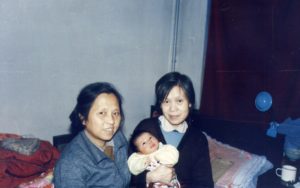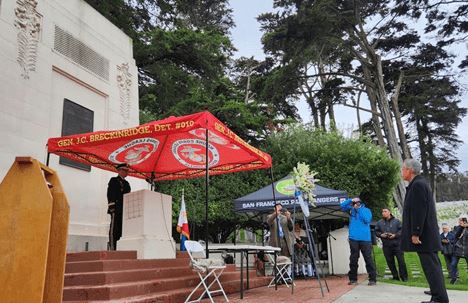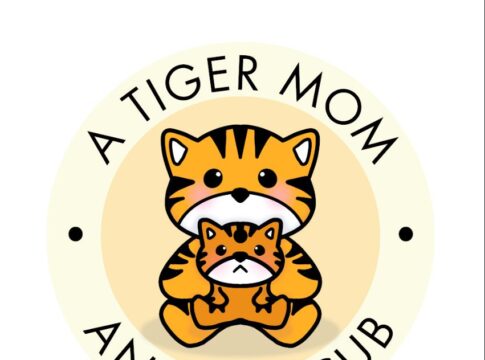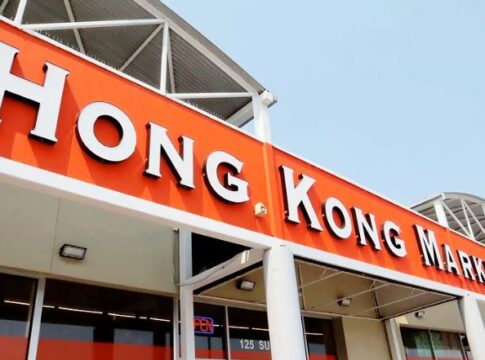
By Kevin Xu
Moments after I watched Mirai Nagasu, the history-making Japanese American figure skater, finish performing her free skating program, I got a text from my dad. “Your grandma is really sick. You should come back.” I booked my flight right away and flew out the next day to my place of birth.
I often call this place, Shenyang, China’s Pittsburgh, because it also used to be the country’s main steel producer with dreary climate but hardy people. The old capital of Manchuria (if it was ever a country), Shenyang also has its own Forbidden Palace though its former glory is now forgotten, as it tries to find its way forward while many other Chinese cities have already found theirs and are leaving it behind. I come back to this struggling city of 8 million people, because of two people whom I also left behind–my paternal grandmother (Grandma P) whose sickness brought me back this time, and my maternal grandmother (Grandma M) whose senior home apartment I stayed at during this trip.
The anthology of Asian Americans often focuses on our joint victimhood and struggle–racial discrimination, bamboo ceiling, persistent “otherization”–and rightfully so. But a less-told story is our relationship with relatives who are still living in our countries of origin. Every Asian American story has two messy threads across the Pacific: the shifting dynamic with our kins who stayed back, and the rapid advancement of Asia that propels these shifts.
For me, these two threads have two distinct versions, reflected in the lives of my two grandmas.
LATEST STORIES
Grandma P, the ailing one, has always been resentful that all her children and grandchildren immigrated to North America and left her behind. She never forgave us, was always in poor health, and used her conditions to drive home the point that our choice to immigrate was wrong–neglectful of the virtue of filial piety. She’s usually alone with her thoughts and grievances, and rarely socializes.
Grandma M was much less bitter. After her husband (my maternal grandfather) passed away three years ago, she was determined to live her life, her way. She found her senior home via a friend, and moved in by herself without telling anyone in the family beforehand. She goes to singing lessons, makes flowers out of wires and stockings, and has made many friends with whom she trades the latest health tips. She misses her children and grandchildren, but has plenty going on without us around.
Grandma P has an iPad, but never tried to use it. She would rather talk to her family on the same landline phone that I remembered her using 20 years ago, when I lived with her as a child.
Grandma M has a smartphone, and is not only a fluent user of WeChat and Taobao, but even showed me a new, trendy app called Pinduoduo (a social shopping platform where you make batch purchases with strangers to get better deals). She carries little cash and pays for most things digitally. She’s ahead of the curve, not just compared to her fellow senior friends, but to me–her millennial grandson, who works in tech, in Silicon Valley.
Grandma P, when she’s healthy, would often ask me in an accusatory tone, “What’s so great about America anyways?” I used to be able to tick off a long list of why’s, but that list is shrinking.
On the world stage, PyeongChang just showed off one of the most digitally advanced Olympics yet. Tokyo and Beijing, the next two Olympic hosts respectively, will no doubt look to outdo its South Korean neighbor. In the cities, the brand new metro systems in Asian metropolises and the high speed rails that connect them are doing laps around the NYC subway lines and Amtrak. On the micro-level, the digital life that throbs on Grandma M’s smartphone is a telling microcosm of just how advanced (and penetrating) technology is in Asia.
To be sure, there are still many poor corners of Asia, where basic human needs are hardly met. But those corners are getting smaller, and shrinking with them is the sense of advantage (even superiority) that Asian Americans often feel toward their relatives in Asia, who are supposedly “left behind.”
During my visit, a major news item was dropped onto China and the world. A proposal to amend the Chinese constitution was announced, effectively ensuring that the current Chinese president, Xi Jinping, can rule the country for life. Sitting in Grandma M’s living room, for the first time in a long time, I learned of news about China straight from its official mouthpiece, CCTV 1, the state-run television station.
I asked Grandma M what she thought of this development. She approved. When I asked her about Xi potentially being president for life, she retorted, seemingly knowing where I was going with this line of question, “Xi is doing a great job. What’s wrong with having a good leader for a long time? Look at you guys, Obama was great, but he had to step down. Now you have Trump! I don’t like Trump. Wouldn’t it be great if Obama could keep on being president?” Even though the spirit and wisdom of the 22nd amendment was clearly lost on her, I was tongue-tied and didn’t have a comeback. A part of me wished for the same thing.
When I visited Grandma P the next day, she was barely conscious, breathing heavily from one tube and urinating out of another. She’s always been bit of a news junkie, so I told her about the constitutional amendment, just in case she could hear me. After my narration, she nodded ever so slightly as if to issue her approval as well, not that she (or Grandma M, or any other ordinary Chinese citizen) would’ve had a say in it either way.
Two days later, Grandma P breathed for the very last time and quietly left this world. I’m not sure if she left with more peace and less resentment, but she no longer has to fight with us about whether America is great anymore.
Asian Americans have been fighting for generations to succeed, advance, and ultimately fit in, which continues to be a struggle. For those who’ve decided to return to Asia to be part of its rise, fitting in is no easier, because our “American” ways don’t necessarily sit well with the new Asia and are no longer taken for granted as “advanced thinking from the West.” The internal debate that many Asian Americans are perhaps having these days is, “do we belong…anywhere?”
When I landed in SFO after this 6-day trip, packed with activities and emotions, I took a long, deep breath of the moist Bay Area air. I felt relieved and relaxed. I knew where I belong. I like my freedom, my vote, and my Stephen Colbert. However, it’s a belonging defined not by an organic affinity, but a conviction of choice.
Kevin Xu (@kevinsxu) is co-host of the Model Majority Podcast (@modelmajorityp), former Obama White House staffer, and currently works at the enterprise tech startup PingCAP.
AsAmNews has Asian America in its heart. We’re an all-volunteer effort of dedicated staff and interns. Check out our Facebook page and our Twitter feed, Please consider interning, joining our staff or submitting a story for consideration.







